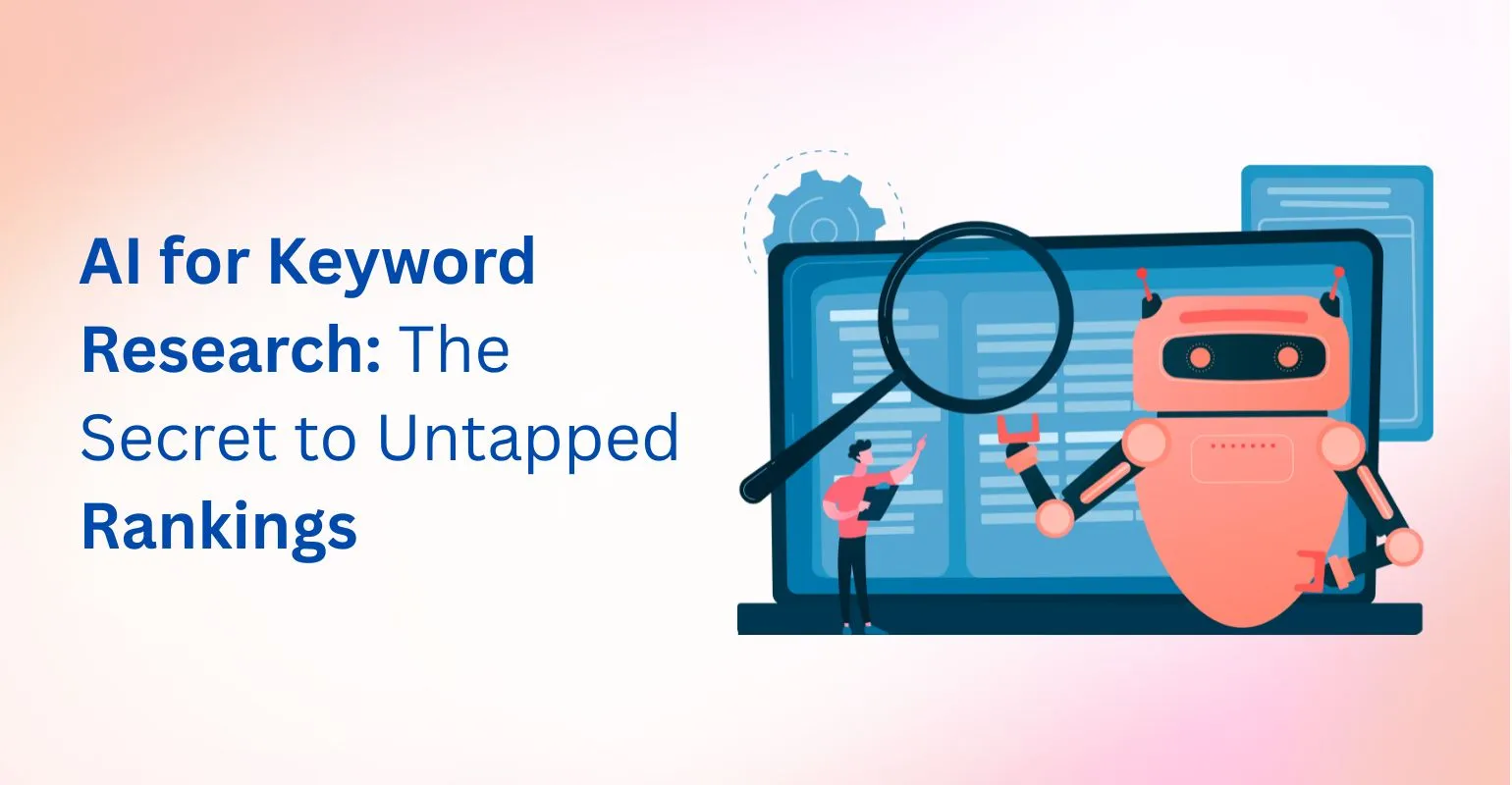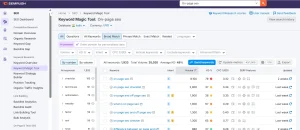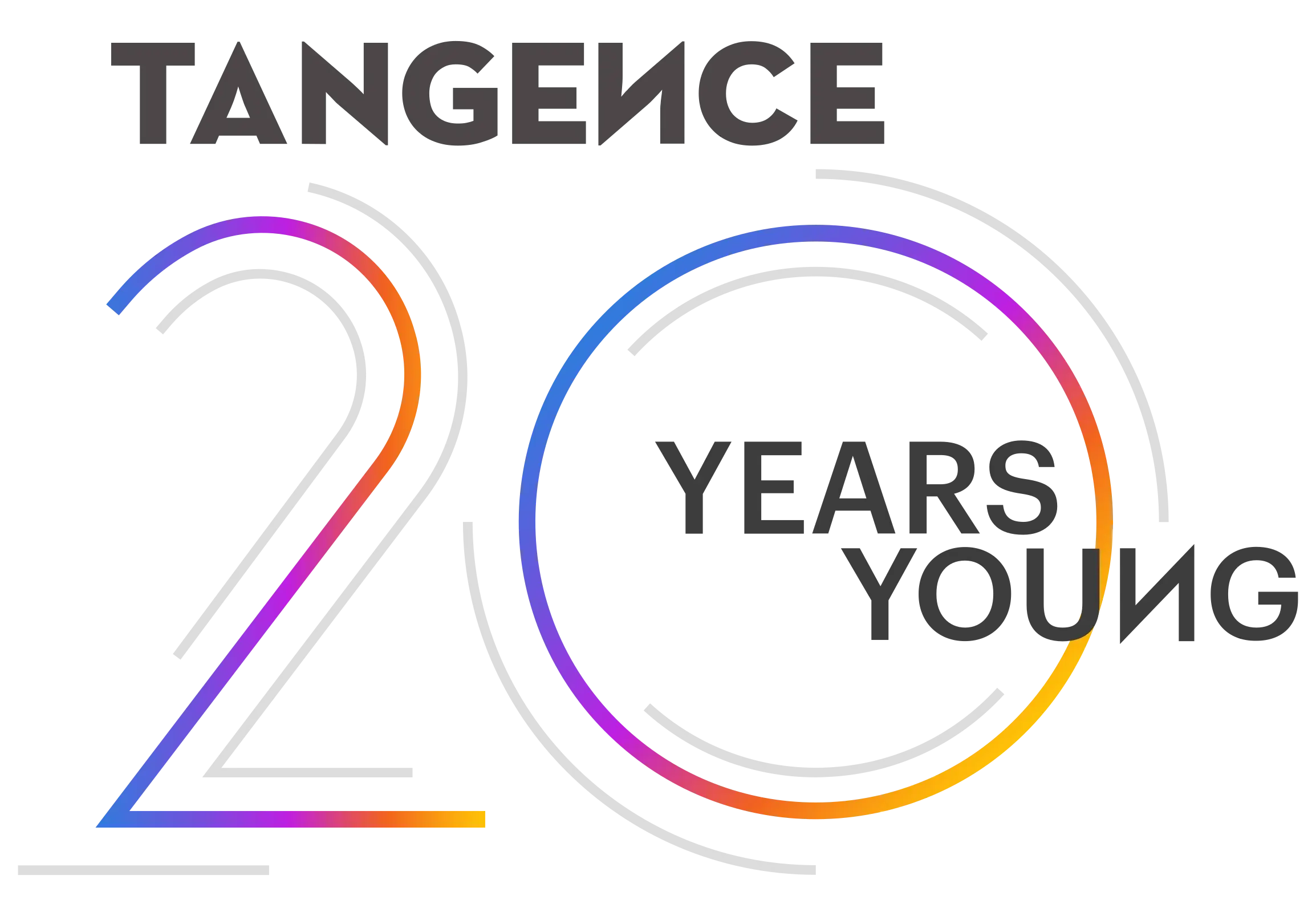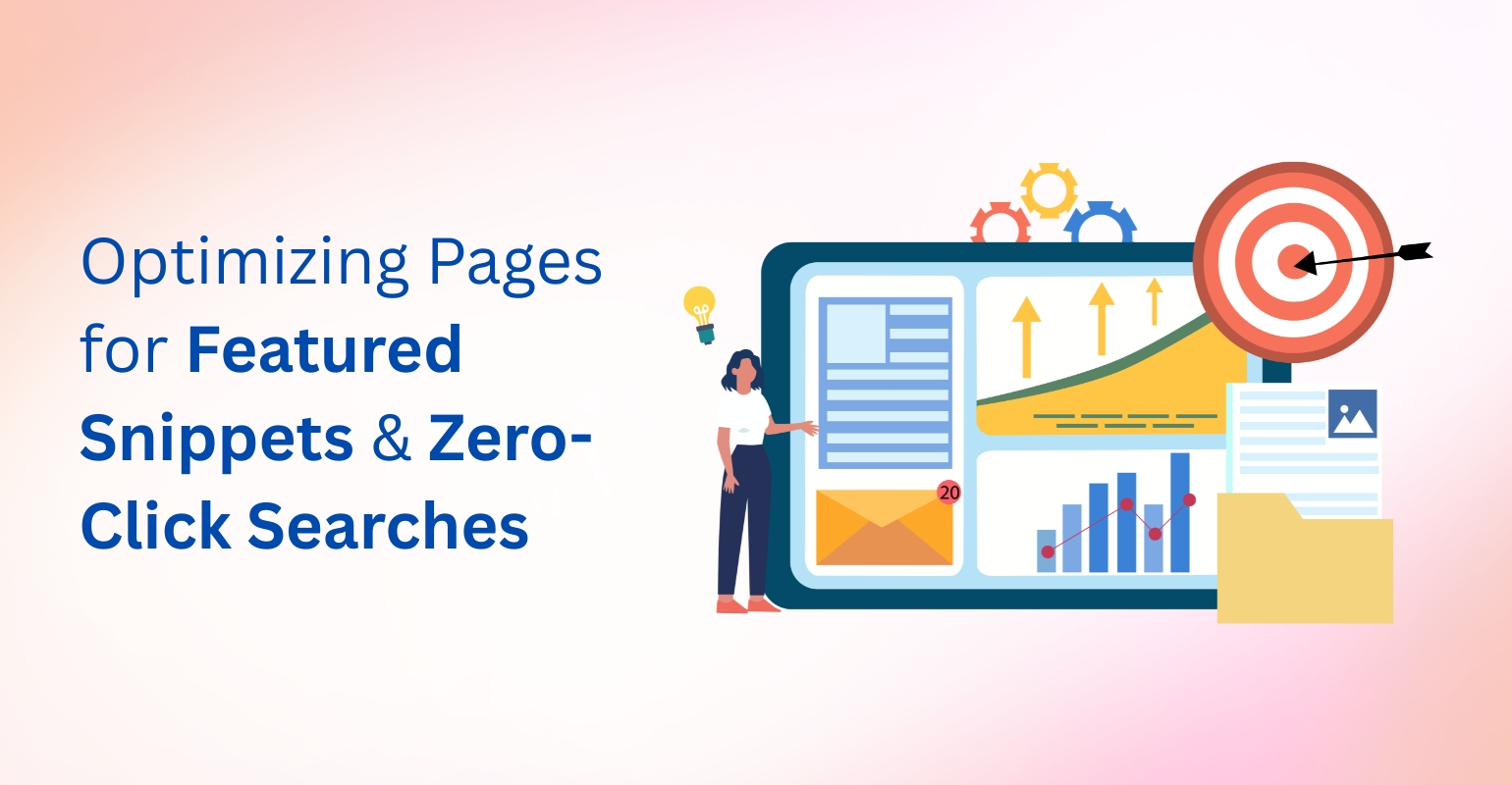blog
AI for Keyword Research: The Secret to Untapped Rankings

Traditional Keyword Research Is Broken (Here’s How AI Fixes It)
If you’re still relying on traditional keyword research guessing terms, chasing high search volume, or using basic tools, you’re missing out on a lot of SEO growth.
The truth is, old methods can be slow and incomplete. They often overlook valuable opportunities that bring in targeted traffic the kind of visitors who are ready to engage or buy.
That’s where AI for keyword research changes the game.
AI doesn’t just collect data; it understands how people actually search. Using advanced algorithms and natural language processing (NLP), AI tools find patterns, intent, and connections between words that humans often miss.
Instead of random keyword suggestions, AI uncovers strategic opportunities:
-
Terms aligned with user intent
-
Hidden long-tail keywords
-
New search trends you can rank for early
The result? Your content reaches the right people at the right time.
In this blog, you’ll learn what AI for keyword research is, how it works, and how to use it to get better rankings and organic traffic in 2025.
What Is AI for Keyword Research?
Traditional keyword research can feel like guesswork. You enter a seed keyword, scroll through endless lists, and pick terms based on volume and difficulty.
AI changes this completely.
By using machine learning and NLP, AI tools analyze huge amounts of search data and go beyond simple keyword matching. They understand context, intent, and relationships between words.
This means AI can:
-
Spot semantic clusters (related groups of keywords).
-
Suggest long-tail phrases you might never think of.
-
Recognize what people actually want when they type a query.
Think of AI as your smart SEO assistant one that processes billions of data points in seconds and uncovers insights traditional tools can’t.
Popular AI-powered tools include:
-
Jasper
-
Surfer SEO
Why does this matter? Because Google is smarter than ever. It doesn’t just rank pages stuffed with keywords. It rewards content that matches intent and answers user questions naturally.
By using AI-driven keyword research, you’re not just keeping up with SEO trends you’re staying ahead.
How AI Finds Keywords You’d Never Think Of
One of the biggest advantages of AI for keyword research is its ability to uncover hidden opportunities.
Here’s how it works:
1. Semantic Understanding:
AI doesn’t just look at individual keywords. It understands how words relate in real-world searches.
For example, instead of just suggesting “best SEO tools,” AI might suggest:
-
-
“SEO software with AI features”
-
“automated keyword research tools”
These are more specific and often less competitive.
-
2. Long-Tail Keywords:
AI excels at finding long-tail phrases. These are longer, more specific searches with lower competition and higher conversion rates.
Example: A business discovered “voice search SEO tips” using AI tools. Targeting this led to a 30% traffic boost in just a few months.
3. Search Intent Matching:
AI analyzes whether someone is searching to learn, compare, or buy. By aligning your keywords with this intent, you attract visitors who are more likely to engage.
This is why AI-powered keyword research isn’t about quantity it’s about quality and relevance.
For example, when you enter a simple seed keyword like on-page SEO, AI tools don’t just spit out basic keyword variations. They generate related checklists, comparisons, intent-driven keywords, and even question-based searches you might never have thought of.
Here’s a live example from SEMrush’s Keyword Magic Tool.

Image Source: Screenshot from SEMrush Keyword Magic Tool
Why Using AI for Keyword Research Boosts Your SEO
Using AI tools gives you advantages that traditional methods can’t match:
-
Faster results: AI processes massive data sets far faster than any human can. This means you discover keyword opportunities at scale often in minutes rather than hours or days.
-
Better targeting: AI digs deeper into user intent and semantic relationships. It’s not just about keywords with high search volume; it’s about finding terms that truly match what your audience is looking for. This means your content ranks better because it answers real questions and fits the way people search.
-
Trend spotting: AI helps you stay ahead of trends. It identifies emerging keywords and seasonal shifts, so you can create timely content that attracts early traffic and ranks before your competitors.
-
Voice search ready: With voice assistants on the rise, more people use natural language queries. AI-powered tools catch these nuances, helping you rank for voice search keywords that traditional tools often miss.
-
Smarter content clusters: AI-powered keyword research helps you build smarter content clusters. By grouping related keywords semantically, you can create interconnected content that search engines love, boosting your topical authority.
All of this translates into stronger SEO, higher rankings, and more organic traffic.
Step-by-Step Guide: Using AI for Keyword Research to Supercharge Your SEO
Ready to put AI to work for your keyword research? Follow these steps to unlock powerful insights and boost your SEO results.
Step 1: Choose the Right AI Keyword Research Tool
There are plenty of AI-powered tools available like Jasper, Surfer SEO, SEMrush’s Keyword Magic, and more.
Pick one that fits your budget and goals. Most offer free trials, so test a few before committing.
Step 2: Input Your Seed Keywords
Start with a few core keywords related to your niche or business.
These are your “seed” keywords, the starting point for AI to generate expanded keyword suggestions.
Step 3: Analyze Semantic Clusters and Long-Tail Suggestions
AI will present groups of related keywords, often clustered by topic or intent.
Focus on these clusters rather than isolated keywords they help you build comprehensive content.
Step 4: Filter Keywords by Volume, Difficulty, and Relevance
Not every keyword is worth targeting. Use the tool’s filters to find keywords with a good balance of search volume and manageable difficulty.
Also, consider how relevant they are to your business and content goals.
Step 5: Prioritize Keywords That Match User Intent
Look beyond the numbers think about why someone is searching for a term.
Is it informational, transactional, or navigational?
Prioritize keywords that fit the stage your target audience is in.
Step 6: Integrate AI-Suggested Keywords into Your Content Strategy
Use these keywords to plan blog posts, landing pages, or FAQs.
Incorporate them naturally into your titles, headers, and body copy for maximum SEO impact.
Bonus Tip: Use AI to Generate Content Briefs and FAQs
Many AI tools can help you create detailed content outlines and FAQ sections based on your keyword clusters.
This saves time and ensures your content covers all relevant subtopics.
Common Mistakes to Avoid
While AI is a powerful tool, it’s not magic. There are some common pitfalls you need to watch out for.
Mistake 1: Blindly Trusting AI Suggestions
AI tools can suggest a lot of keywords but not all of them are valuable or relevant. Always apply your own judgment and business knowledge before targeting a keyword.
Mistake 2: Ignoring Search Intent
Don’t just chase keywords with high volume. Understand the user’s intent behind the search. Are they looking to learn, buy, or compare? Align your content accordingly.
Mistake 3: Overstuffing Keywords
Using AI-suggested keywords is great, but stuffing them unnaturally into your content hurts readability and SEO. Use keywords strategically and naturally.
Mistake 4: Not Updating Keyword Research Regularly
AI models and search trends evolve quickly. Make sure to revisit your keyword strategy regularly and adjust based on new data.
By avoiding these mistakes, you’ll get the most value from AI-powered keyword research and create content that truly resonates with your audience.
The Future of AI in Keyword Research
AI isn’t just a buzzword it’s shaping the future of how we do SEO.
Generative AI models are becoming smarter, capable of understanding context and intent better than ever before.
This means keyword research will get even more precise, with AI anticipating what users want before they even type their queries.
Voice and conversational search will continue to grow, and AI will help marketers optimize for these natural language queries.
Staying ahead means embracing AI tools and integrating them into your SEO workflows now.
Unlock Explosive SEO Growth with AI-Powered Keyword Research
AI for keyword research is no longer a nice-to-have it’s a must-have for anyone serious about SEO in 2025 and beyond.
By leveraging AI, you uncover hidden keyword opportunities that traditional tools miss, align your content with real user intent, and stay ahead of search trends.
But AI works best when combined with human strategy using insights thoughtfully to create content that connects and converts.
Ready to supercharge your SEO with AI-driven keyword research?
At Tangence, we specialize in blending cutting-edge AI technology with proven SEO tactics to help businesses dominate search rankings and drive organic growth.
Get in touch today to learn how our AI-powered SEO services can take your keyword research and content strategy to the next level.
Frequently Asked Questions
Q1: What is AI for keyword research?
AI for keyword research uses artificial intelligence algorithms like machine learning and natural language processing to analyze search data and suggest relevant keywords beyond simple exact matches.
Q2: How is AI keyword research different from traditional methods?
Unlike traditional tools that rely mostly on search volume and basic suggestions, AI understands user intent, semantic relationships, and search context, providing more relevant and comprehensive keyword ideas.
Q3: Can AI tools replace human SEO experts?
No. AI tools enhance the keyword research process by uncovering opportunities faster and deeper, but human expertise is essential to interpret results, strategize, and create high-quality content.
Q4: Are AI-suggested keywords more effective for SEO?
Often, yes. AI uncovers long-tail and semantically related keywords that better match search intent, which can drive more targeted traffic and improve rankings.
Q5: How often should I update my keyword research using AI?
SEO and search trends change constantly. Ideally, update your keyword research every 3-6 months, or more frequently if you’re in a competitive or fast-changing niche.
Q6: What are the best AI keyword research tools in 2025?
Some top tools include Jasper, Surfer SEO, SEMrush Keyword Magic, Ahrefs (with AI features), and Clearscope.
Q7: How does AI handle voice search keywords?
AI understands natural language and conversational queries, helping you discover keywords optimized for voice assistants and smart devices.




